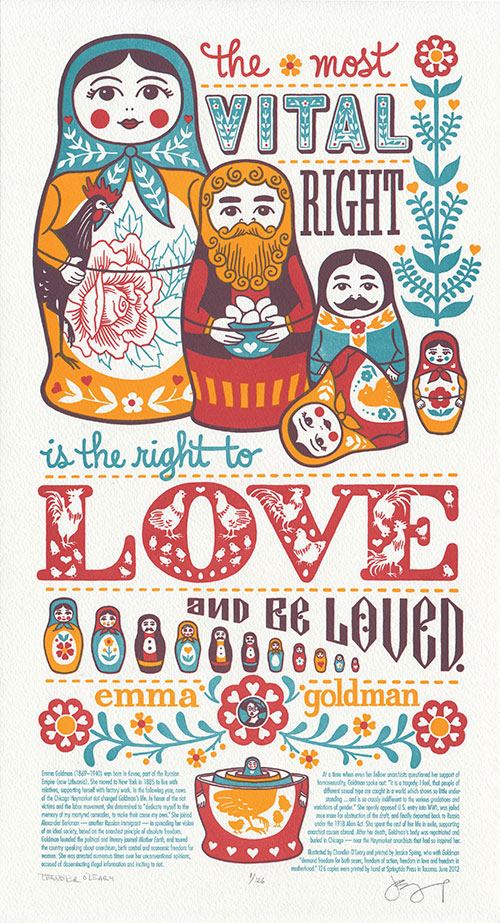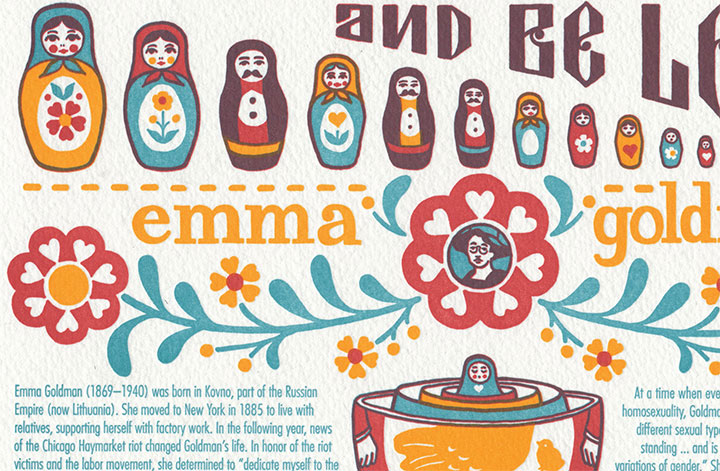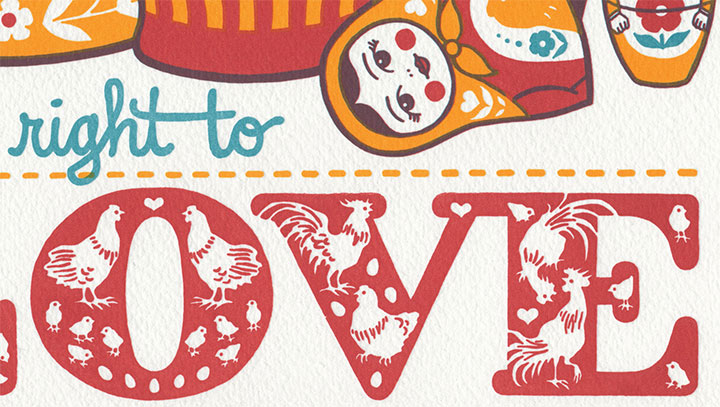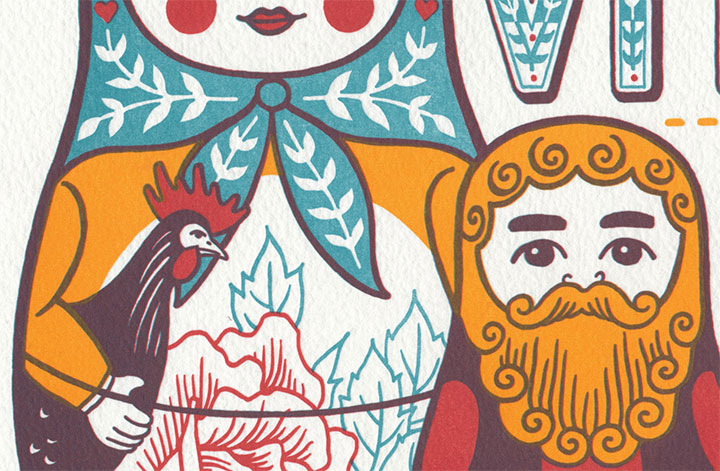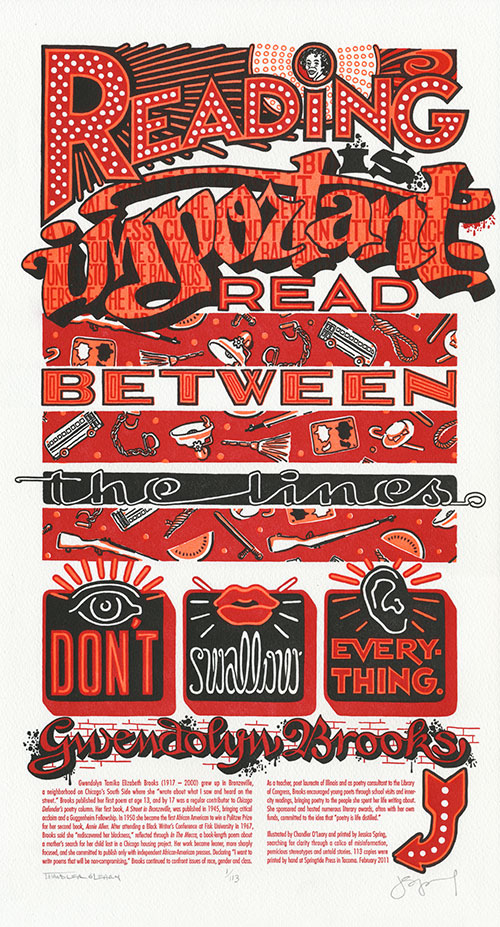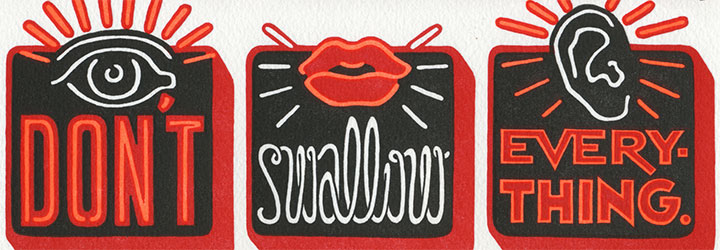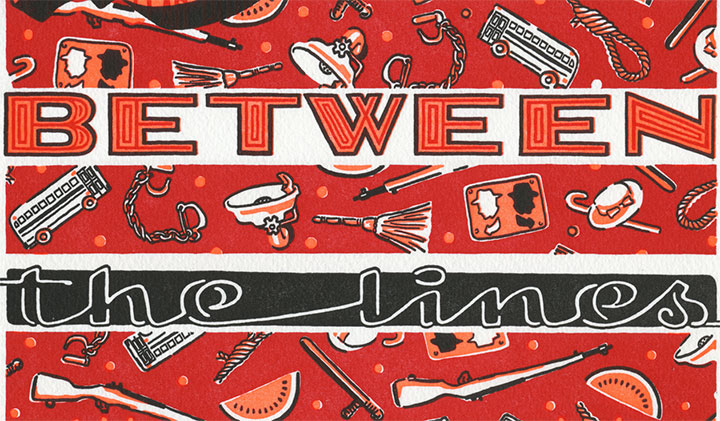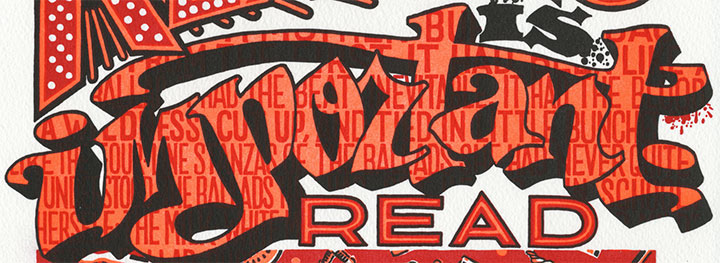If you happen to live in Washington state, you can’t help but notice that love is in the air. It’s not quite what you think, though—rather than turtledoves and cupids flying around, the breeze is carrying ballot petitions and angry voices.
Though Washington became the seventh U.S. state to legalize same-sex marriage earlier this year, opponents forced a voter referendum to decide the issue this November. So while we’d rather just toast our friends and their families, we’ve got to put up our dukes first.
Already tempers are running high, and everyone seems to be up in arms—it’s total anarchy out there. So we thought, who better to talk to………… than an anarchist?
The most vital right is the right to love and be loved. —Emma Goldman
Huh. Pretty down-to-earth for an anarchist, actually. Especially if you consider some of the other things Emma’s said in the past.
I think that if we could somehow put all the ladies we’ve featured previously into a room together, they might end up killing each other (good thing they’re already dead, eh?). They all had such different ideologies and passions that I can’t imagine all fourteen of them agreeing on any one thing. But I’m fairly sure they’d be united over Emma—in thinking she was a complete weirdo, that is. (Sorry, Emma.)
Yet for all her outlandish creeds and fierce opinions, her thoughts on families, love and motherhood cut straight to the heart of the matter. And that’s what drew us to her.
To pay homage to Emma’s folksy words, we turned to folk art for inspiration. (Get out your grandma’s Pyrex and raise a glass!) Love Nest is dominated by a lively brood of nesting matryoshka dolls. Each individual is different, but together they complete the picture of a nurtured, multicolor family. Roosters, hens and chicks complete the flock waiting for the next generation to hatch as Emma’s words stitch the family together.
To support the diversity nested within every family, we’ll be donating a portion of the proceeds to both the Rainbow Center and Oasis Youth Center, right here in T-town. The Rainbow Center is dedicated to eliminating discrimination based on sexual orientation and gender. Oasis is a drop-in support center dedicated to the needs of GLBTQ youth ages 14-24.
Speaking of chickens, there’s another tribute hiding in here—a nod to the very first matryoshka doll ever made.
This might well be the most difficult piece we’ve tackled yet. Beyond the challenges of marrying (no pun intended) the views of a 19th-century fringe activist to modern-day social issues, we also had some seriously precarious business on the technical side. Those of you who are into the nitty gritty details of letterpress may know that each print color requires a separate plate, a separate pass on press. We’ve got four colors in the final result, but because of the tricky magic of translucent inks, there’s actually only three plates/three passes here. The red and teal mix to make brown—which means that the registration (alignment) of each plate had to match up just right.
I was expecting Jessica to throttle me when I showed her the color separations, but as usual, she barely even batted an eye: “Yeah, we can do that.”
Or maybe she just knows me so well now that she’s expecting the crazy.
• • • • • • • • • • • • • • • • • • • • • • • • • • • • • • • • • • • • • • • • • • • • • • • • • • • • • • • •
Love Nest: No. 15 in the Dead Feminists series
Edition size: 126
Poster size: 10 x 18 inches
Printed on an antique Vandercook Universal One press, on archival, 100% rag (cotton) paper. Each piece is numbered and signed by both artists.
Colophon reads:
Emma Goldman (1869 – 1940) was born in Kovno, part of the Russian Empire (now Lithuania). She moved to New York in 1885 to live with relatives, supporting herself with factory work. In the following year, news of the Chicago Haymarket riot changed Goldman’s life. In honor of the riot victims and the labor movement, she determined to “dedicate myself to the memory of my martyred comrades, to make their cause my own.” She joined Alexander Berkman—another Russian immigrant—in spreading her vision of an ideal society, based on the anarchist principle of absolute freedom. Goldman founded the political and literary journal “Mother Earth,” and toured the country speaking about anarchism, birth control and economic freedom for women. She was arrested numerous times over her unconventional opinions, accused of disseminating illegal information and inciting to riot.
At a time when even her fellow anarchists questioned her support of homosexuality, Goldman spoke out: “It is a tragedy, I feel, that people of different sexual type are caught in a world which shows so little understanding … and is so crassly indifferent to the various gradations and variations of gender.” She openly opposed U.S. entry into WWI, was jailed once more for obstruction of the draft, and finally deported back to Russia under the 1918 Alien Act. She spent the rest of her life in exile, supporting anarchist causes abroad. After her death, Goldman’s body was repatriated and buried in Chicago—near the Haymarket anarchists that had so inspired her.
Illustrated by Chandler O’Leary and printed by Jessica Spring, who with Goldman “demand freedom for both sexes, freedom of action, freedom in love and freedom in motherhood.”
UPDATE: poster is sold out. Reproduction postcards available in the shop!
